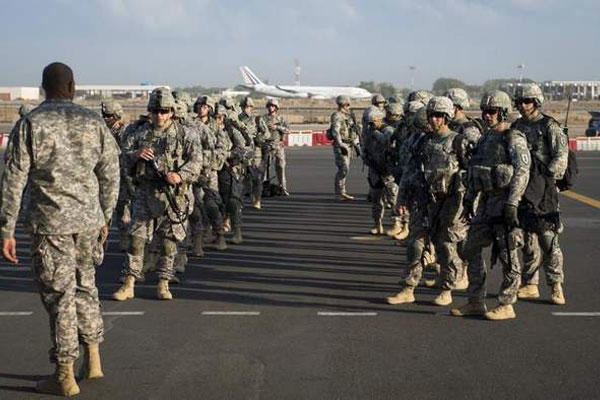The U.S. was moving regional troops and aircraft closer to South Sudan as a precaution should they be needed for more evacuations of diplomatic and aid personnel, Pentagon officials said Monday.
Army Gen. David Rodriguez, head of the Africa Command (AFRICOM), had ordered the "repositioning of forces in the region to give himself maximum flexibility" to respond as the crisis in Sudan threatens to spiral into civil war, said Army Col. Steve Warren, a Pentagon spokesman. Along with troops, AFRICOM is also repositioning U.S. military aircraft.
Warren did not specify how many troops were on the move or their destinations, saying that "the last thing we want to do is tip off anyone who wants to do us harm." However, CNN and Reuters is reporting that 150 Marines are moving from Moron Air Base in Spain to a U.S. base Djibouti.
If called upon, the U.S. troops would be limited to assisting in evacuations and providing security for the aircraft involved at the direction of the State Department, Warren said.
The re-positioning of forces was in line with the precautions announced Sunday by President Obama in a letter to Congress. "I may take further action to support the security of U.S. citizens, personnel, and property, including our Embassy, in South Sudan," said Obama, who was vacationing in Hawaii over the holidays.
Nearly 100 U.S. troops were already on the ground in South Sudan, Obama said in the letter. On Dec. 18, 45 AFRICOM troops were sent to guard the U.S. Embassy in Juba, the capital, and an additional 46 troops were sent Saturday to help evacuate civilians, the letter said.
Warren also said that three of the four U.S. troops who suffered gunshot wounds in an aborted attempt to evacuate U.S. civilians last week would likely be flown today from a hospital in Nairobi, Kenya, to the U.S. Landstuhl Regional Medical Center in Germany for further treatment.
The fourth individual was remaining in Nairobi until he was medically cleared for transfer to Landstuhl. Pengtagon and AFRICOM officials have yet to identify the wounded personnel or their services.
All four suffered "lower extremity" wounds Saturday when three CV-22 Osprey tilt-rotor aircraft, the Air Force version of the Marines' MV-22 Osprey, were hit by small-arms ground fire as they attempted to land in the town of Bor, which had been seized by South Sudanese rebels.
All three Ospreys from Combined Joint Task Force-Horn of Africa (CJTF-HOA) sustained damage, aborted the mission and diverted to Entebbe, Uganda, AFRICOM said. A U.S. C-17 aircraft later flew the wounded to Nairobi.
On Sunday, U.S. and allied civilian aircraft managed to reach Bor and evacuated personnel who were trapped in the fighting, Jen Psaki, a State Department spokeswoman, said in a statement Sunday.
"So far, we have evacuated approximately 380 U.S. officials and private citizens and approximately 300 citizens of other countries to Nairobi and other locations outside South Sudan on four chartered flights and five military aircraft," Psaki said.
On Dec. 20, the U.S. joined in a United Nations Security Council statement expressing "grave alarm and concern regarding the rapidly deteriorating security and humanitarian crisis in South Sudan resulting from the political dispute among the country's political leaders."
The statement also called on South Sudan President Salva Kiir and former Vice-President Riek Machar "to bring a swift and peaceful resolution to the crisis by calling for a cessation of hostilities and immediately commencing a dialogue."
Kiir, from South Sudan's Dinka ethnic group, has accused troops loyal to Machar, from the Nuer community, of trying to launch a coup. Kiir dismissed Machar, along with the Cabinet, in July.
South Sudan is the world's newest independent state, recognized as such by the U.S. on July 9, 2011 following its secession from Sudan.
The UN estimates that about 500 people have been killed and more than 100,000 displaced since factional fighting began earlier this month.





























